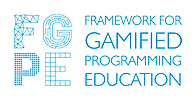O1: LTI Integration (software)
One of the intellectual outputs of the completed Erasmus+ project FGPE is an open-source gamified interactive environment for learning programming. It is implemented as a separate web platform to which a student can log in to solve programming exercises served in a gamified form (e.g., as challenges and quests rewarded with points and badges etc.). While it supports OAuth2 to allow students log in using their university email account credentials (if the email provider supports it, as does, e.g.,…


